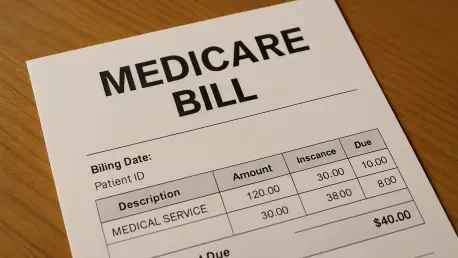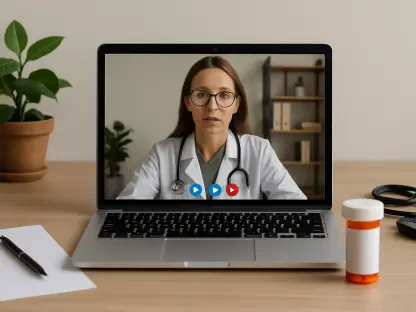In a significant stride toward enhancing healthcare access for Medicare beneficiaries, a recent legislative move by the U.S. House Ways and Means Committee has sparked optimism and debate across the medical technology sector, centering on a bill designed to streamline temporary Medicare reimbursement for breakthrough medical devices. This legislation, backed by the FDA’s designation, ensures that innovative treatments reach patients more swiftly, addressing longstanding delays in coverage that have hindered timely access to cutting-edge technologies. However, as discussions unfold, concerns about safety, oversight, and potential misuse linger, setting the stage for a nuanced policy debate. This advancement represents a critical opportunity to balance the urgent need for innovation with the imperative of maintaining rigorous standards, making it a focal point for lawmakers, industry stakeholders, and patient advocates alike.
Legislative Progress and Bipartisan Support
A Milestone in Healthcare Policy
The recent advancement of this Medicare coverage bill by the House Ways and Means Committee marks a pivotal moment in healthcare reform, with a resounding 38 to 3 vote showcasing rare bipartisan unity. Spearheaded by Rep. Blake Moore of Utah, the legislation aims to create a clear and efficient pathway for temporary reimbursement of breakthrough devices, addressing delays that have frustrated both manufacturers and patients. The overwhelming support signals a shared recognition among lawmakers of the transformative potential these technologies hold for improving patient outcomes. By focusing on eliminating redundant reviews at the Centers for Medicare and Medicaid Services (CMS), the bill seeks to prioritize speed without sacrificing essential checks. This strong backing from across the political spectrum suggests a collective urgency to modernize Medicare policies in line with rapid advancements in medical technology, setting a foundation for broader reforms.
Addressing Historical Challenges
Delving deeper into the context, the push for this legislation stems from persistent challenges in reimbursement processes that have plagued the system since CMS rescinded a related program several years ago. That decision left a gap in coverage pathways, often delaying patient access to innovative devices by months or even years, despite FDA approval for breakthrough status. The current bill introduces a voluntary application process for manufacturers, aiming to reduce bureaucratic hurdles while maintaining safety and efficacy standards. This approach reflects lessons learned from past shortcomings, with provisions to review the medical necessity and reasonableness of devices to curb potential billing abuses. As lawmakers navigate this terrain, the focus remains on crafting a policy that rectifies historical inefficiencies while ensuring that Medicare beneficiaries can benefit from the latest medical advancements without unnecessary wait times.
Debates and Future Considerations
Balancing Innovation with Oversight
As the bill progresses, a central debate revolves around striking the right balance between fostering innovation and ensuring robust oversight to protect Medicare beneficiaries. Critics, including Rep. Lloyd Doggett of Texas, have raised valid concerns about the potential weakening of CMS authority, warning that insufficient safeguards could open the door to fraud or misuse of the reimbursement system. During committee discussions, unease surfaced over the lack of clarity in addressing these risks, with some lawmakers feeling the process has been rushed. Despite the bill’s intent to streamline access, these apprehensions highlight the need for meticulous policy design to prevent loopholes. The challenge lies in creating a framework that accelerates coverage for breakthrough devices while preserving the integrity of the Medicare system, ensuring that patient safety remains paramount amid rapid technological advancements.
Expanding the Scope and Refining Safeguards
Looking ahead, another key consideration is the scope of the legislation, with calls from industry advocates and some lawmakers to include diagnostics alongside devices in the coverage pathway. Medtech trade groups like AdvaMed and the Medical Device Manufacturers Association have voiced strong support for the bill but argue that its current focus is too narrow to fully address innovation needs. Meanwhile, Rep. Moore has committed to collaborating with colleagues like Rep. Suzan DelBene of Washington to strengthen fraud prevention measures and refine the bill’s provisions. This collaborative spirit suggests that the final version could evolve to encompass broader categories of medical technology while incorporating stricter controls. As discussions continue, the emphasis on refining safeguards and potentially expanding coverage reflects a cautious yet progressive approach to shaping a policy that aligns with both industry aspirations and public health priorities.
Reflecting on a Path Forward
Reflecting on the journey of this legislation, the House Ways and Means Committee took a bold step by advancing a bill that garnered widespread bipartisan support, highlighting a shared commitment to enhancing healthcare access through innovation. The debates, led by figures like Rep. Moore and Rep. Doggett, underscored the complexities of balancing speed with scrutiny, while industry input pushed for a more inclusive scope. As the process unfolded, the focus on addressing past reimbursement delays and preventing potential fraud shaped a narrative of cautious optimism. Moving forward, the collaboration among lawmakers to refine safeguards and consider diagnostics offers a promising avenue for a more comprehensive policy. Stakeholders are encouraged to monitor how these refinements take shape, as the final legislation could set a precedent for future Medicare reforms, ensuring that breakthrough technologies reach those in need with both efficiency and accountability.









